So, the question is, “Can you take the Vega-ness out of a Vega?” The Chevrolet Vega (1971-1977) rightly takes its lumps for the “lump” that was its engine. It had other foibles too but the iron head, aluminum block with silicon cylinder liners was its biggest black eye. What if….that wasn’t the case and the Vega took a completely different direction? Well, this 1976 Chevrolet Vega is certainly a different take on how Chevrolet originally envisioned and designed it, so let’s examine it more closely. It is located in Dundee, Michigan and is available, here on eBay for a current bid of $7,805, reserve not yet met. Thanks to Rocco B. for this tip!
There will be many different reactions to a post regarding a Chevrolet Vega as there were many varying experiences over the years, but I can tell you from experience, the majority are not encouraging. Having been the warranty repair guy at a Chevy dealership in ’73 & ’74, I got my fill of the Vega hi-jinx and the overwhelming majority of shortcomings surrounded the engine with its sleeveless cylinder-liner alloy construction and its tendency to overheat and crack. But even if they didn’t implode, they were wretched performers, especially with Chevrolet’s notorious two-speed Powerglide automatic transmission. C’mon, it’s ’71 and a two-speed is still in use? There were plenty of other problems such as body rust in the tops of the fenders, of all places, and just pathetic fit and finish issues but the engine was the go-to problem area.
One bright spot that occurred in 1975 was the introduction of the Cosworth Vega, a performance variant that used an entirely different engine produced by both Chevrolet and Cosworth Engineering. It was slightly smaller than the Vega’s weak link 140 CI, inline-four, but was fuel-injected with a DOHC cylinder head and considerably more powerful. Offered in ’75 and ’76, Chevy produced about 3,500 Cosworth copies and the seller claims that this example is one of those more coveted models. Its Firethorn Red finish and complementing interior hue, however, is a surprise as all of the initial ’75 run, and most of the ’76s were black. In ’76, other colors were included and Firethorn was on the amended list – this is the first non-black Cosworth that I have encountered. And this car does identify as a Cosworth thanks to its dash plaque and engine-turned instrument panel applique. Actually, this Vega looks good in red, the finish is a bit flat but the body is in nice, straight shape, still wearing its gold trim and distinctive wheels, and showing no sign of rust or rot.
The real surprise is under the hood as the Cosworth four has given way to a modded out 350 CI Chevy small-block V8 that has been enlarged slightly to 355 CI. The seller adds, “I was told that the engine and transmission were both gone through within the last couple of years and it runs and drives excellent“. “Gone through” has to be the most overused weasel words in automotive promotion – and it’s not helped by the tagline, “I was told…“, it just builds defensive suspicions. It’s nice to know that it runs and drives “excellent” but it would probably have been best to leave it at that and not encourage open questions around the powertrain’s viability. A four-speed automatic O/D transmission, with 3.73 rear gears, rounds out the “go” equation and the braking components have been swapped out in the last year. All in all, the conversion job looks well-executed.
The interior of this Chevy has held up surprisingly well. The mileage is recorded as 56K miles but there is no claim that this is a genuine measure. In spite of the low mileage, time is often as much an enemy of interior components as is use – especially if a lot of sunshine is involved. As with everything else in the malaise era, GM’s interiors took a turn more towards cheapness but they were still pretty presentable and durable and markedly better than what followed in the ’80s and ’90s. The seller mentions that the cut-pile carpet has faded but that’s expected with this much passage of time. Originally, Cosworth Vegas were only available with black interiors as standard and white vinyl as an option. After the change in allowable exterior colors, interior hues included red (Firethorn) and tan (Buckskin) – and red is always a nice find as it’s so much more interesting than the commonly found mundane black or charcoal gray, shades that seem to be the only allowable choices today.
If this is the small car that Chevrolet could have built? I guess it would have kicked the economy car aspect of the Vega to the curb. But installing a V8 in a Vega was clearly on GM’s designer’s minds because a small-block V8 will slide in with a minimum of hassle. And 1975’s compact Monza did exactly that with the newly introduced 262 CI (4.3 liter) V8. Oh what could have been, the Vega’s reputation could have veered in a totally different direction with a different and more durable prime mover under the hood. If you would like to see more, check out this running video, it does the car more justice than the still images.
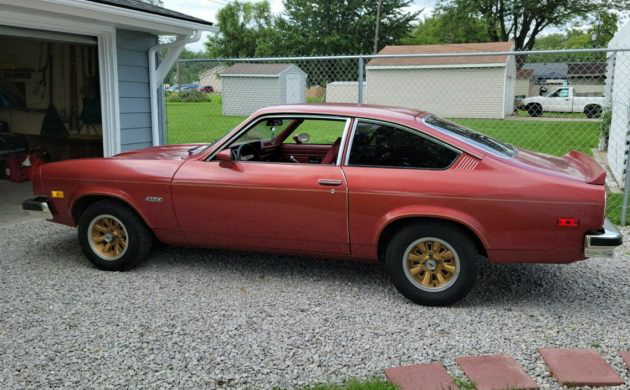
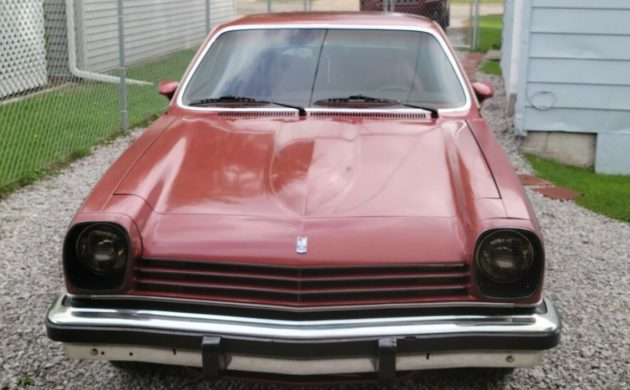
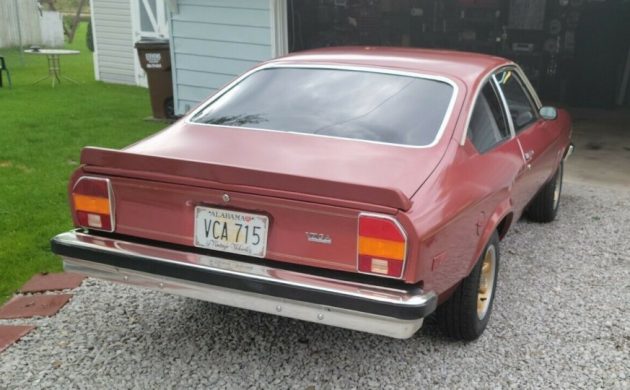
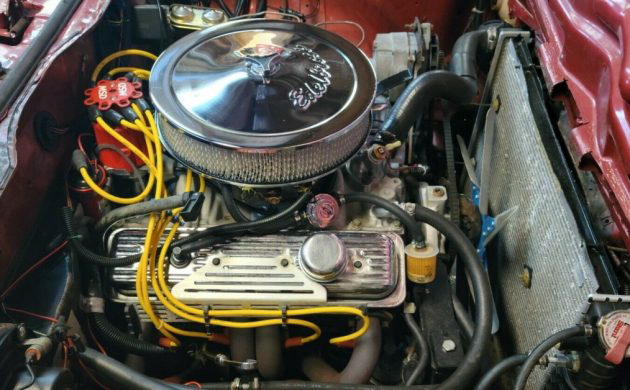
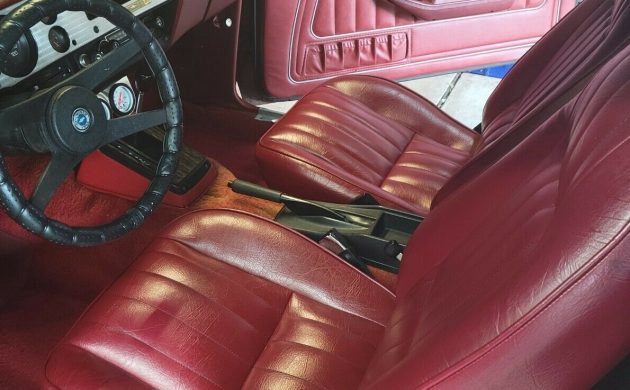
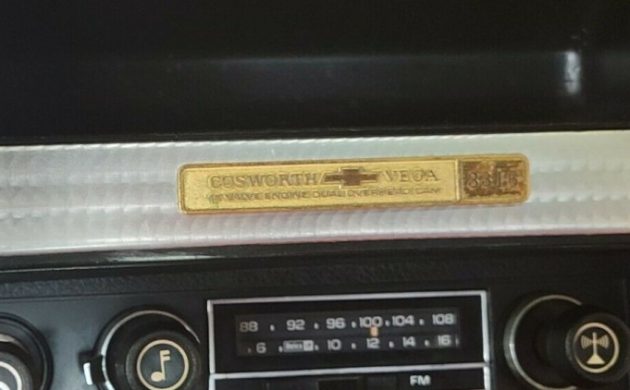






I doubt this Vega will struggle to up any hill! Sounds pretty good as well. Curious to see where bidding ends up on this one. I was just talking to my friend about doing a Vega V8 but using the aluminum Buick 215 for its lightness. Of course a small block with aluminum heads and manifold wouldn’t weigh much more. He owned a black 76 Cosworth during his time at the dealer. They were cool cars but unfortunately the bad rap they got with their initial build quality and overheating issues the public wasn’t buying it.
Yes, it was a crap Chevy Vega body with about 20 more horsepower for almost the price of Corvette. Sometimes, the public is smart. And no a/c
The 215 Buick was about 325 pounds with the flywheel and generator I believe. A very light engine. The small block Chevy with aluminum heads would be at least 150 pounds heavier. I think the Buick would be a very sweet ride. Finding a Vega is almost impossible in California.
Looks like a nice car and the condition is outstanding. However, I’d hardly call it a Cosworth Vega anymore at this point. While some of the Cosworth components might still be present, the original motor and trans are long gone. That aside, the V8 upgrade should provide a lot of fast fun.
More appropriate a swap would have been a much more recent 4-banger like a turbo version of the Ecotec as used in Solstice/Sky cars. Those have plenty of hop-up capability, and would have to result in a much better balanced car.
Oh, and a Manual Trans would also be high on my list of preferences….
Engine sounds pretty healthy in the seller’s walk around video. These are fun cars with V-8s.
That Cosworth 4 cylinder is a sweet little engine that was about 10 years too soon for the technology it really needed. Add today’s engine management, and, innercooled turbo charger to the original engine now THAT would make for a great Vega! I’ve been around more than my share of V8 Vegas back in the day, not the most balanced combination…….
Vega, Astre, Monza, Starfire, Sunbird or Skyhawk can all be fun cars when you stuff a V-8 in them.
I drove a 1972 Vega notchback from 1977 to ’81. My father gave it to me for free; it was actually not a bad car to drive. After a couple of years, though, the front upholstery was shot, and there was oil in the coolant and coolant in the oil. Oh, and the muffler fell off. Oddly, it didn’t rust! I lived in Southern California, so no bad weather.
Every Cosworth Vega i’ve ever seen,both years,had a gold engine turned dash.So is that a replacement dash with the plague refastened..or a mystery for Professor Gadget?
Great interior – best seats in a subcompact back then.
What’s wreched is the “styling” of today’s 4 door only subcompact appliances.
My friend’s ’68 nova with 250 6 cyl & over 300k miles still has it’s original powerglide with no repairs or slippage – verified with a tach. Quite peppy with 3:07 rear, few options & turbo muffler. Can lay rubber without power braking.
Other than a turbo 400, find me another model of auto trans still kickin after 53 yrs with no repairs & high mileage! The glide is also very lightwt & has very little internal power robbing resistance, unlike the turbo 400.
My kind of Vega.
Bob Sr. Or Jr? Gary Saxton here. Hope Sohayda’s Brother. How’s everything back in the Buckeye? I had 2 74’s. My 1st Vega was great the. 2nd not so great.
AH, my first car memories. A 1976 Vega, manual transmission. Not a Cosworth and dark brown.
Kind of moronic to swap this car. Now it’s just another boring V8 Vega swap. Zzzzzzz….
Definitely false advertising not a Cosworth Vega anymore🥵
The VIN says it is regardless of its current engine. That goes for any car where the engine was part of the draw, that goes fir BOSS Mustangs, Hemi mopars, ZR1 Corvettes.
Steve R
The V8 is just lipstick on a pig.
Some people complain that their ice water is too cold
I’ve never had the COWL rust on a car as badly as on the Vega. A friend in college had a Vega GT: the rust was so bad that windshield wiper mechanism was held into the cowl with duct tape! What a piece of Manure…. though a V-8 and a stick might have helped me not hate it as much.
The cowl design was a major defect, known to the engineers.
The way it was designed, it was impossible to apply rust proofing effectively.
When they eliminated the plastic fender liners, it insured that in northern climes, the bare steel would be exposed to a constant stream of salty snow slurry
If this had a Cosworth four cam V8 from an Indy car, it would still be a Vega. With an iron V8 in the front I suspect it has some real balance and traction issues. I’m also curious what might have made it sit so high in the front. As I recall, most Vegas sat pretty level and were a good bit lower. Perhaps some stiffer springs to offset the extra weight? The execution of the swap looks to be high quality and it likely goes like stink n a straight line. But, its still a Vega. I had a very pretty little blue Vega wagon (or square back – I think they called it). I wanted to love it. It just wouldn’t let me. It broke on its first trip away from home in western Kansas in the middle of the night in a snow storm. It over-heated. I drove that little car almost 4000 miles. I hated almost every one of them.
Vega wagon models were originally marketed as “Kammbacks”. If you look at the roofline profile and the way the backlight angles down in the back the actually do follow Kamm’s original design. The intent was to reduce turbulence behind the car which was done to improve fuel mileage.
Maybe it’s just me, but doesn’t putting the big “350” callouts on the side kinda kill the sleeper potential here? Back in the day, going stealth was one of the key benefits of doing an SBC swap into one of these cars in the first place.
Unfortunately, at the end of the day the only thing putting a V8 in these cars really did is make them accelerate faster. It didn’t change all the poor design and crappy quality they were known for.
My dad had a low number cosworth vega from the first run of them. Ultimately he gave it away telling the person they could just have it and the title if they would promise to never ever bring it back to the house. The comment I heard from my dad was that the fate of the cosworth vega was known when they found rust on the aluminum bumpers in the showroom. Anyhow, with the V-8 it might just be a driver.
To the writer:
No Vega had cylinder liners installed from the factory. Not one
The entire purpose of the Nicholasville alloyed, successfully used by Porsche in the 928, ways to avoid the expense I’ve cast iron cylinder liners which had added about $150 per unit in the earlier Buick aluminum V-8’s
The alloy works only in a narrow temperature range, and Chevrolet’s decision to employ a completely in adequate radiator sealed the Vega’s fate as the world’s worst Automobile
Yes, that’s exactly what I stated, it was sleeveless. Chevrolet used some sort of a silicon compound in the alloy block that obviously didn’t work.
JO
Porsche made the nikasil alloy work ok with the aluminum 928 engine.
The Reynolds alloy requires good temperature control At correct operating temperature, the silicon particles expand into the cylinder and the hard silicon particlesrubs against the rings. If the engine overheats, the particles retreat, and the rings scrap on bare aluminum, wearing the block prematurely. The brilliant cost cutters at Chevrolet put in an inadequate radiator, guaranteeing failures.
On a ’74 firebird 400 without a/c, you could order heavy duty cooling which gave you the thicker radiator that cars with a/c got.
Was there an optional hd bigger radiator avail for vegas w/o a/c? If so, can i assume cooler runing non a/c vegas with the bigger optional radiator might have had a chance to survive?
It’s a good question.
The standard radiator for the non a/c Vega was a small two pass unit. Probably sufficient a VW Bettle (yes, that’s the point) Putting this inadequate radiator in a car with an engine based on a new technology, where temperature control was critical, was sheer lunacy
I worked at an Auto Ramp back then, offloading GM vehicles from trains.. These cars were shipped from the factory in a “verti-pack” rail car nose down. You lowered the sides, undid some anchor blocks, then started them up and reversed them. The packing forced all the fluids to the front of the car. They were hard starting, and didn’t have enough power to back themselves out of the wheel wells. Once you got it started, you had to rev it way up, then bang it into reverse to get them off. I’ve long wondered if that abuse to the cylinders contributed to their reputation….